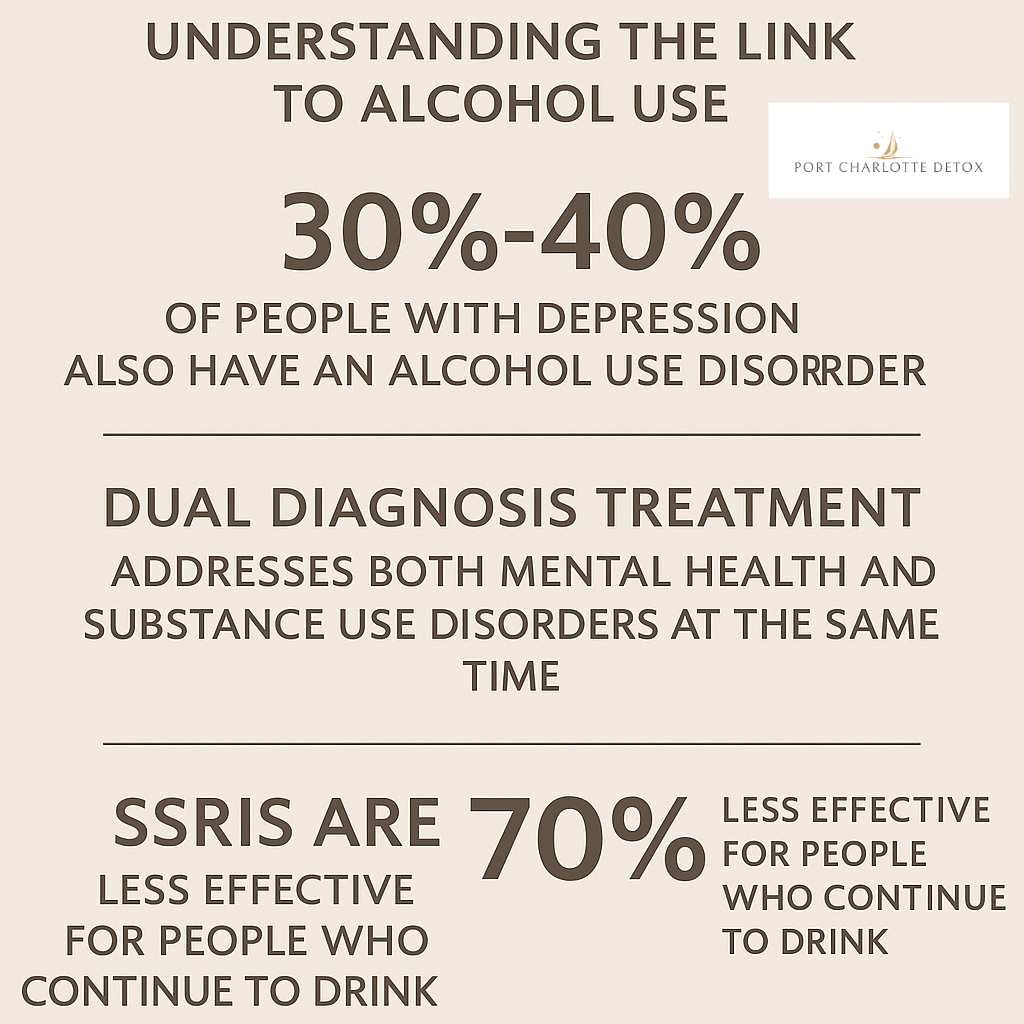Even when you’re trying your best to be okay, something can still feel off.
At first, I thought it was just my mood. So did my spouse. Tired, irritable, low energy—it all pointed to depression. We even joked about needing “more sun and less stress.” But what we missed was this: the alcohol was part of the problem. And part of the reason I couldn’t seem to get better.
If you’re newly diagnosed and scared to face what else might be going on, I want to offer you something small but real: clarity helps. And you’re not broken. You’re just ready to understand yourself more honestly.
Explore dual diagnosis treatment in Port Charlotte if you’re starting to wonder whether there’s more to your story.
It Started with a Bottle—and a Lie I Believed
I didn’t drink to get drunk. I drank to function.
My workdays were intense. Evenings were noisy. I needed to unwind. A glass of wine turned into two, then into a bottle most nights. On paper, I looked fine—working, contributing, showing up.
But under the surface, I was flat. No joy, no curiosity. Everything felt like a fog. My spouse would ask if I was okay, and I’d say, “Just tired.” I even started antidepressants, thinking that would fix it.
What I didn’t admit—even to myself—was that I was drinking while taking those pills. And that combo wasn’t fixing anything. It was making everything worse.
Depression Was the Symptom—Alcohol Was the Hiding Place
One night, after another quiet argument where I shut down instead of speaking up, my partner finally said it:
“I think the drinking is part of this. Not all of it, but part.”
It stung. Not because they were wrong—but because I knew they were right. I’d been using alcohol like a mute button. To quiet emotions. To pause hard conversations. To avoid my own disappointment in myself.
Here’s what I wish I had known:
Depression and alcohol can feed each other. The more I drank, the more emotionally unstable I felt. But the more emotionally unstable I felt, the more I reached for alcohol. It was a loop disguised as “coping.”
What Is Dual Diagnosis Treatment—and Why It Finally Made Sense
Dual diagnosis treatment is care that treats both mental health and substance use disorders at the same time. For someone like me, that distinction changed everything.
In a traditional setting, I might have been treated just for depression. Or just for alcohol use. But the truth is, these issues don’t live in separate boxes. They overlap. They tangle. They get confused for each other.
At Port Charlotte Detox, I wasn’t treated like a problem to be solved—I was treated like a person whose pain made sense, even if the patterns didn’t.
They started with a full clinical assessment. Not just “are you drinking too much,” but also, “what are you feeling, avoiding, fearing?” I wasn’t pushed. I was invited. That mattered.

Detox Wasn’t What I Expected—It Was Better
When people hear “detox,” they think of scary hospital rooms or cold-turkey withdrawal. I did too. I almost didn’t go.
But in Port Charlotte, detox was medically managed and emotionally supported. I had help managing the symptoms of alcohol withdrawal, and I had people checking in—not just on my vitals, but on my emotional state.
They explained how alcohol impacts the brain over time. Why I felt more depressed, not less. Why antidepressants didn’t seem to work when I was drinking regularly.
That clarity alone lifted some of the shame. I wasn’t sabotaging myself. I was uninformed—and scared.
A Spouse’s Perspective: From Confusion to Compassion
My partner once said they felt like they were living with a ghost. Someone physically there, but emotionally unreachable.
We’d spend time together, but I was either distant or agitated. When I stopped drinking, the first thing that came back was presence. Not just in conversations, but in the quiet moments too. I could laugh again. I could listen again.
They told me later:
“I thought you were just depressed. I didn’t know alcohol could look like that.”
It took time to rebuild trust. But dual diagnosis treatment helped us talk in ways we hadn’t before. About masking. About fear. About why I kept drinking, even when I knew it wasn’t working anymore.
You Don’t Have to Choose Between Treating Your Mind or Your Body
This is the part that still feels surreal to say: I feel like myself again. Not a perfect version of myself. Not some high-achieving, never-struggles version. Just… me. Awake. Curious. Connected.
Dual diagnosis treatment didn’t “fix” me. It helped me stop fighting myself.
For anyone in or near Charlotte County or Fort Myers, I hope you know this kind of care exists close to home. You don’t need to keep white-knuckling it. You don’t have to wonder if it’s “just depression” anymore.
If you’re newly diagnosed, scared to try medication, or just unsure what to call what you’re feeling—there’s a place that understands all of that. And treats the whole you.
FAQ: Dual Diagnosis Treatment for Alcohol and Depression
What is dual diagnosis treatment?
Dual diagnosis treatment addresses both a mental health disorder (like depression or anxiety) and a substance use disorder (like alcohol dependence) at the same time. It recognizes that these conditions often influence each other and must be treated together for long-term healing.
Can alcohol cause depression?
Yes. Alcohol is a depressant. It alters brain chemistry and can worsen symptoms of depression. Over time, regular drinking can disrupt sleep, increase anxiety, and dull emotional responsiveness, all of which contribute to depressive symptoms.
I’ve been diagnosed with depression—how do I know if alcohol is part of the problem?
It might be if:
- You use alcohol to cope with sadness, stress, or numbness.
- You’ve tried antidepressants but felt no relief.
- Your mood worsens after drinking—even if you feel better initially.
Talking to a professional trained in dual diagnosis can help clarify what’s really going on.
Is detox required for alcohol and depression?
Often, yes—especially if you’ve been drinking regularly or heavily. Detox allows your body to safely withdraw from alcohol under medical supervision, which is important for both physical safety and mental stability during the early stages of treatment.
How do I talk to my spouse or loved ones about this?
Start simple. You don’t need to have all the answers. Try:
“I think my drinking and my depression might be connected. I want to understand it better—and I think I need help.”
You can also involve them in the process. Many programs, including Port Charlotte Detox, offer support for families.
📞 Ready to talk to someone who sees the full picture?
Call (844)336-2690 or visit to learn more about our dual diagnosis treatment services in Port Charlotte, Florida.


